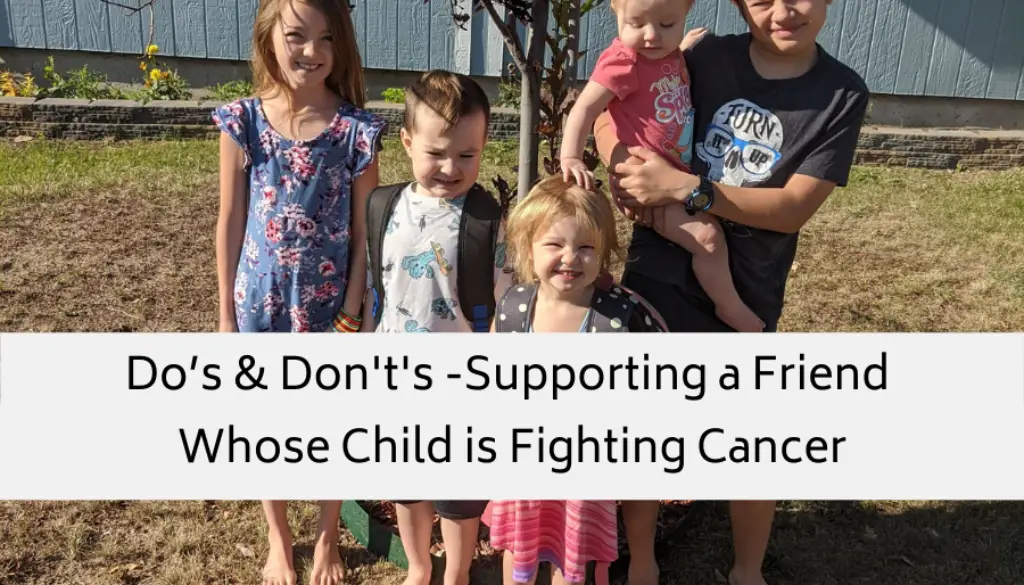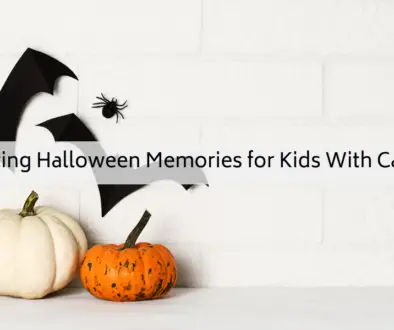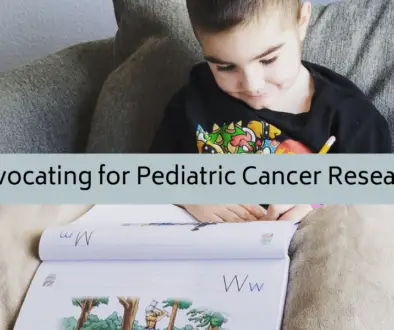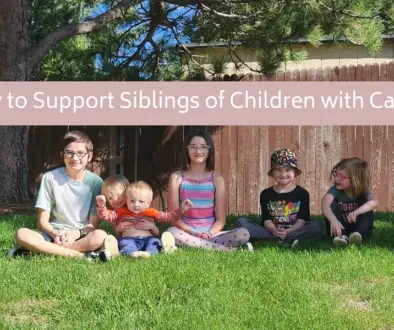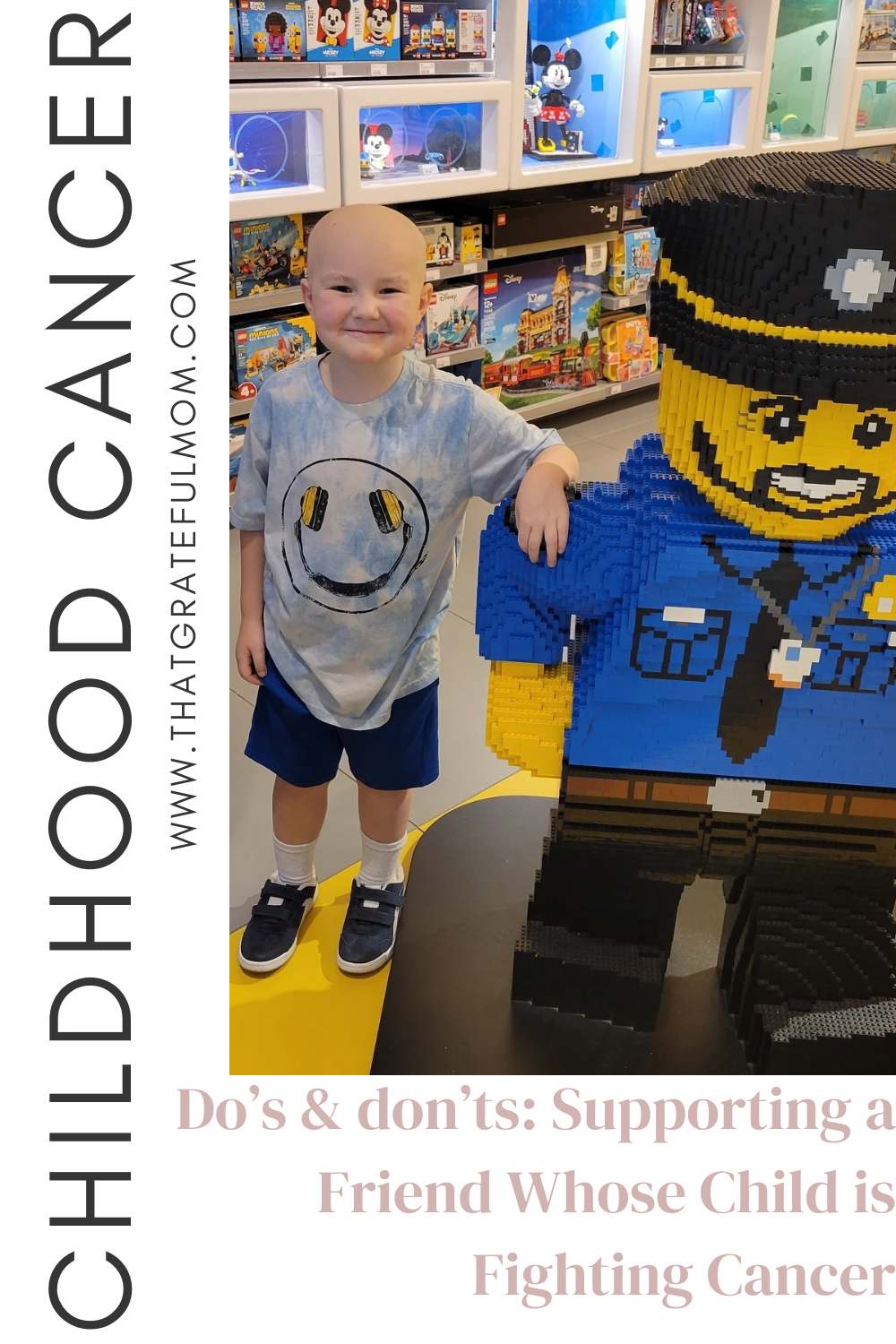
Do’s & Don’ts -Supporting a Friend Whose Child is Fighting Cancer
Did you know that 1 in 285 children are diagnosed with cancer yearly? When I first heard this statistic, I was shocked. I thought maybe 1 in every 1,000, but unfortunately, it’s far more common than that. As a mother of a cancer fighter, I want to share some tips on supporting a friend whose child is fighting cancer. I wish I didn’t have as much knowledge about this topic simply because it’s heartbreaking to see what these children go through, but if I can help another family receive the support and help they deserve, I’ll do whatever it takes.
Today’s post is difficult for me to write up as I think back on those first few months after Lucas’ diagnosis, but some people and organizations were incredibly helpful, and I want to share what was the most helpful during that time. There are dozens of ways to support a friend whose child is fighting cancer, and I’d like to share what we found most helpful while sorting through treatment, schedules, childcare, financial issues, and more. Many moving parts come with a cancer diagnosis, and offering support, being present for the family, and understanding what they may be going through is crucial.
If you’re new to my blog, welcome! I am so glad you are here! My name is Michaela. I’m a mom of six incredible kids, including a cancer fighter. I love sharing about our non-toxic journey, family updates, and encouragement for moms from all walks of life. Here are some of my most recent posts:
How to Support Siblings of Children with Cancer
A Letter to My Son During His Cancer Fight
If you know a family walking through a new childhood cancer diagnosis, this post will help you provide support and encouragement for them. In today’s post, we’ll cover the following:
Do’s and Don’ts- supporting a friend whose child is fighting cancer
Financial challenges and organizations that offer support
Respecting boundaries
Do’s and Don’ts- supporting a friend whose child is fighting cancer
Do let your friend know you’re thinking of them.
When our son was initially diagnosed with cancer, it immediately showed us who would help support us, stay present, and offer help as much as possible. In contrast, it also showed us who wouldn’t. I am incredibly grateful for the friends and family who offered help, watched our kids, cooked, shopped for groceries, prayed, and shared our story. My older sister dropped everything the day she found out and flew from California to Colorado to be with me those first few days. I will never forget much that meant to me. We had been in the hospital for about 3 days when she got there, and I sobbed when I saw her walk into the hospital.
Don’t abandon your family or friends during the hardest experience they’ve ever faced.
My mom and sister were my biggest supports through those first few months. I texted or called them every day with updates and prayers, and I wouldn’t have gotten through that time without them. I was never surprised by their support. What surprised me was the deafening silence I received from people I thought would be there no matter what. Like friends I had seen on a daily basis who completely disappeared when I was too busy focusing on chemo, procedures, and figuring out childcare instead of spending time with them anymore. It was a painful realization.
Do provide distractions for the rest of the family, including siblings.
Siblings are often pushed to the side when a child is diagnosed with cancer. Not intentionally. But because of so many moving parts, appointments, and other obligations during treatment, it can be easy to overlook their needs. Offer to help with siblings, do something fun for them, make them feel special, and be an outlet for them to vent and share their fears. Supporting a friend whose child is fighting cancer includes supporting the entire family. Remember every family member.

Don’t think that your support is too small.
Whatever you are capable of, offer it! If your support includes sending prayers but can’t offer childcare, that’s okay! If you can drop off a meal, a gift card, or send positive thoughts, do it. No offer of support is too small. Families want to know they aren’t alone. Treatment can feel isolating, but knowing someone is thinking of them and praying through those appointments helps more than you could ever know.
Do leave medical advice to professionals.
You may mean well, but parents are already receiving an overwhelming amount of information from providers. Let them focus on what matters most. If you have something important to share, ask the parent if they’re okay with hearing your advice first.
Don’t give unsolicited advice or share statistics.
I don’t know what makes people think it’s okay to share statistics or ask about prognoses after a diagnosis, but I cannot stress enough how important it is to stop yourself from doing this. As a mother whose child has faced nearly 5 years of treatment, relapse, infections, countless medications, and procedures, my mind is filled with fear, potential outcomes, and statistics. It’s inappropriate to ask about statistics or prognosis, no matter how close you are to the family.
Do offer to give parents a break.
No parent wants to leave their sick child, but sometimes a short break to take a hot shower, grab a cup of coffee, or even nap for 20 minutes is necessary for mental health. Even if the parent doesn’t leave, offer to let them step away to take a breather so they can return refreshed and ready to fight for their child.
Don’t visit if anyone in your household is sick.
People who receive chemotherapy are incredibly immune compromised. As much as you may want to help, it’s better to keep your distance if anyone in your home is showing symptoms of being sick. When you have been symptom-free for a few days, check back in. The family will appreciate you being cautious and protecting them from potential sickness.
Another vital way to support a friend whose child is fighting cancer is by providing other resources. I want to share some of my favorite resources that offer financial support. Most families will face needing to take time off work, unpaid leave, childcare issues, and loss of income throughout treatment. Here are some incredible resources for families:
These organizations all offer financial support as well as other resources. They have been so incredible for us throughout our son’s treatment. Between covering mortgage payments, helping with groceries and gas, and providing information on other potential treatment options, we are so grateful to have found them. Consider sharing these foundations as you support your friend whose child is fighting cancer.
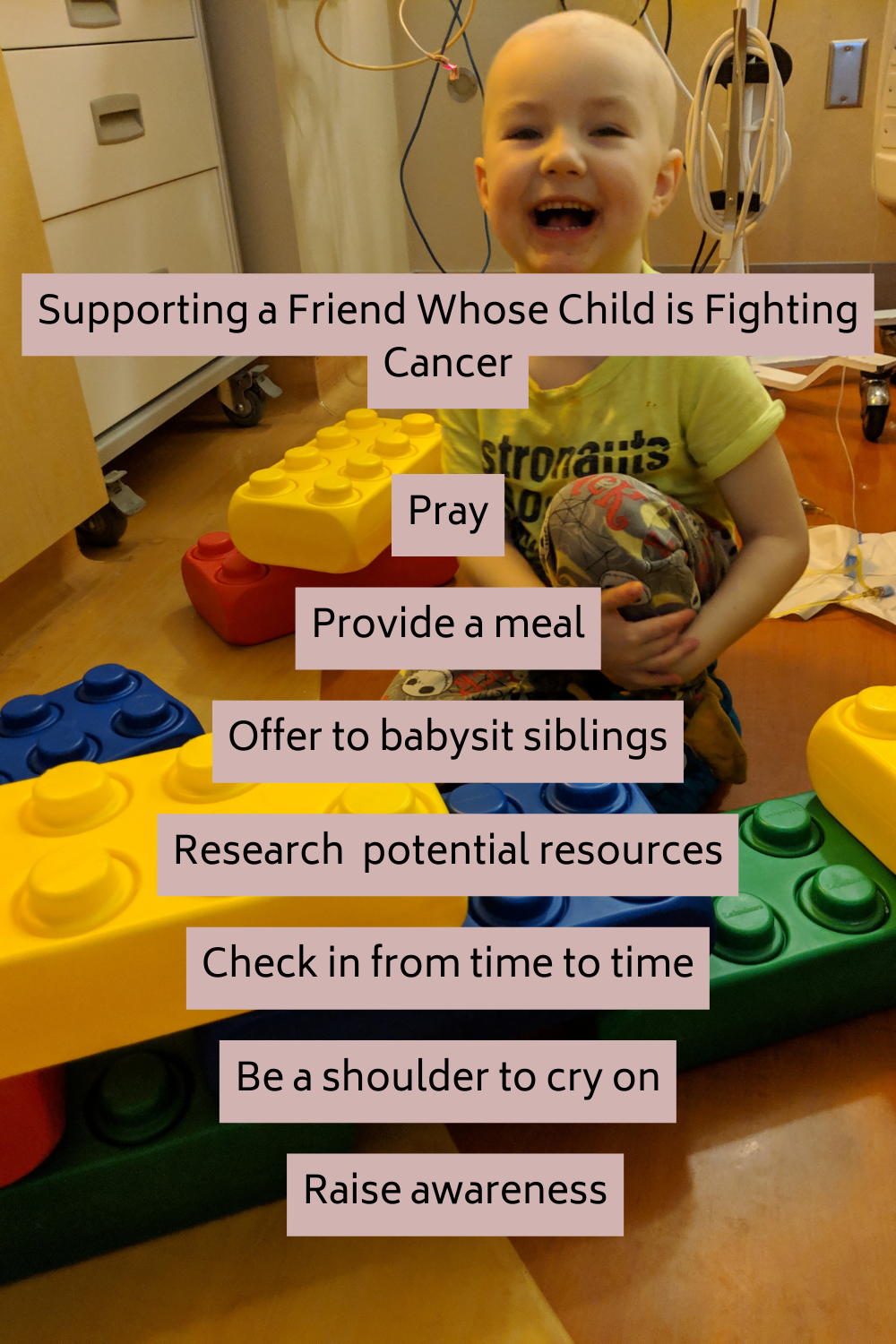
Respecting Boundaries
Each family is different, and what they find most helpful and supportive could vary. While you may mean well, check in and learn what they may find the most supportive. As a family facing the most challenging situation they will ever experience, they are bound to feel overwhelmed and scared. Respect their privacy and honor their wishes during this time.
Conclusion
supporting a friend whose child is fighting cancer may seem difficult at times, but being present, offering prayers and good thoughts, and checking in with the family are incredible ways to offer support. Remember to respect their wishes and let them know you’re willing to help however possible. Your support doesn’t go unnoticed and reminds them they aren’t alone during this difficult time.
Thank you so much for reading my post on supporting a friend whose child is fighting cancer. I hope it has helped you know how to help. Remember to save and pin this post to your favorite board on Pinterest.
Until next time,
-M
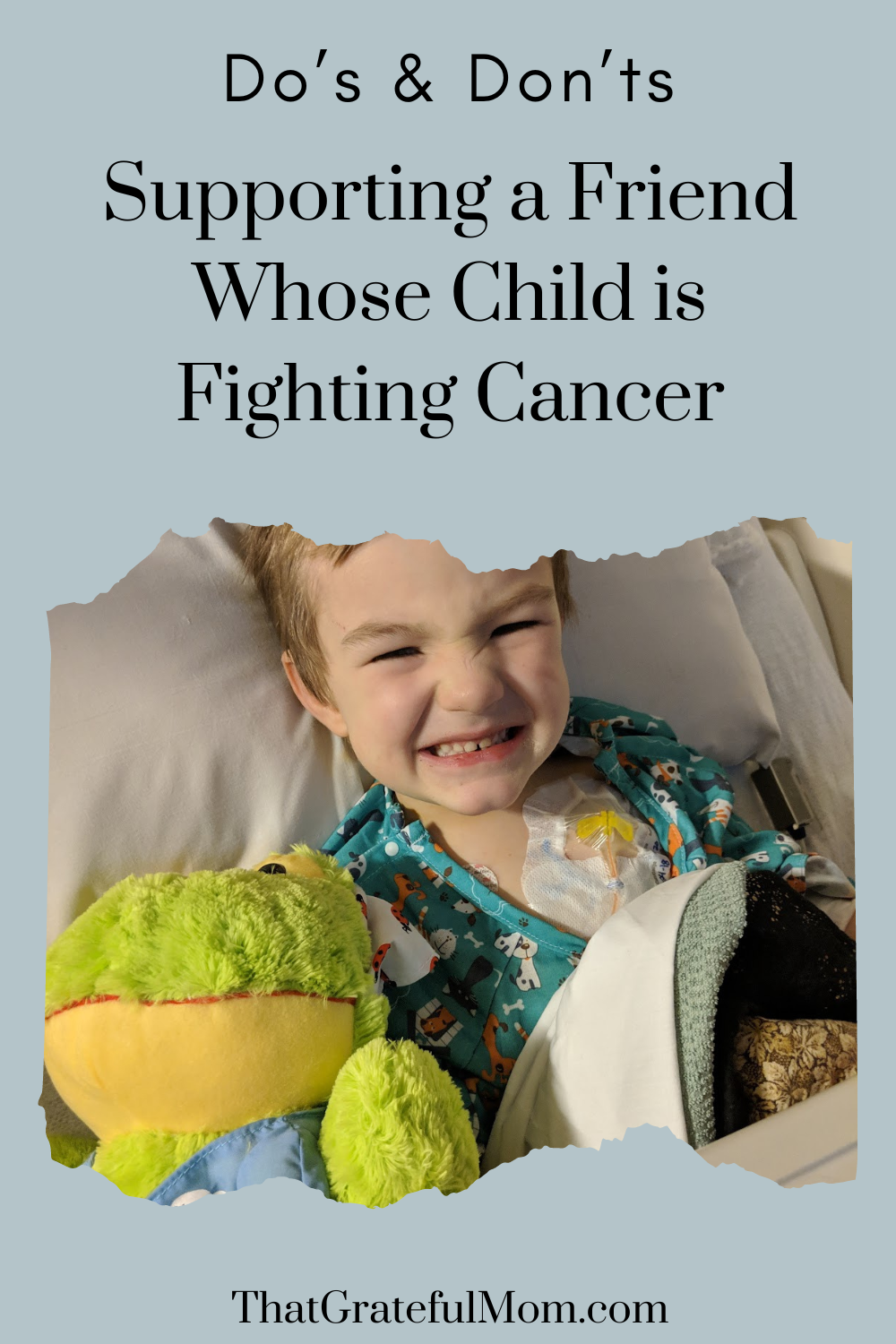
This site may contain links to affiliate websites including Amazon. I may receive an affiliate commission for any purchases made by you through Amazon or other potential affiliates and no additional cost to you. Thank you for your support.

